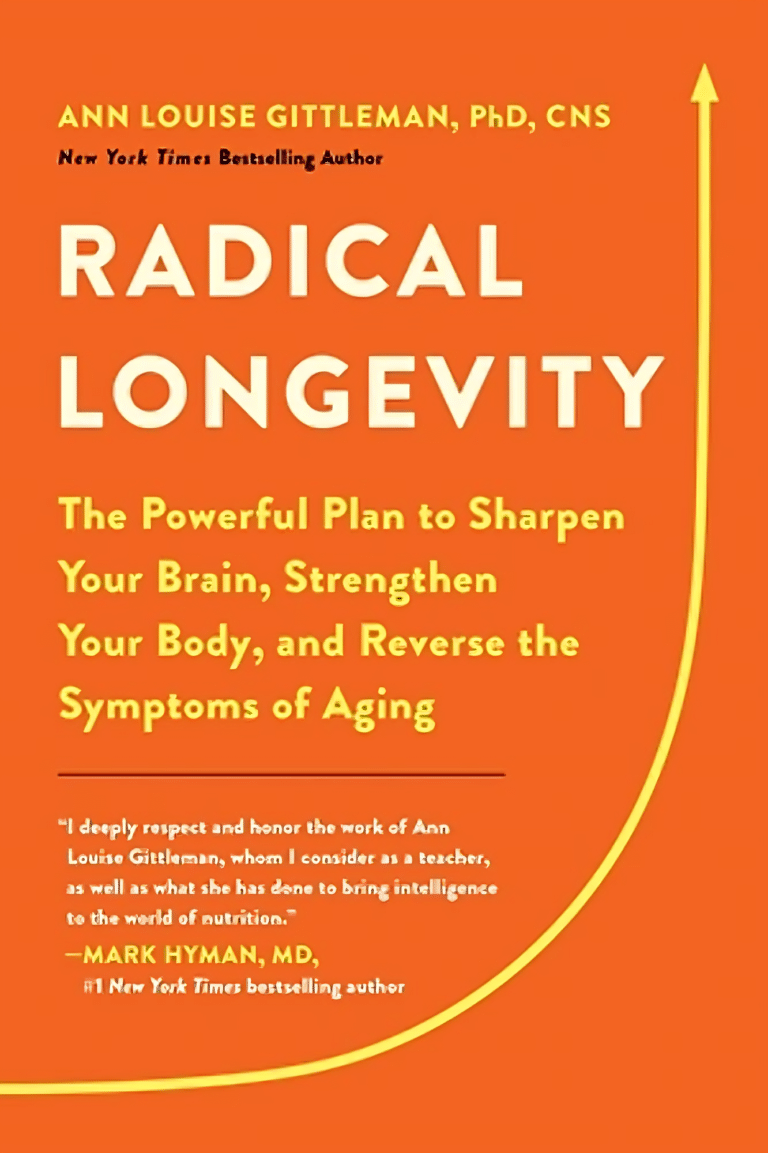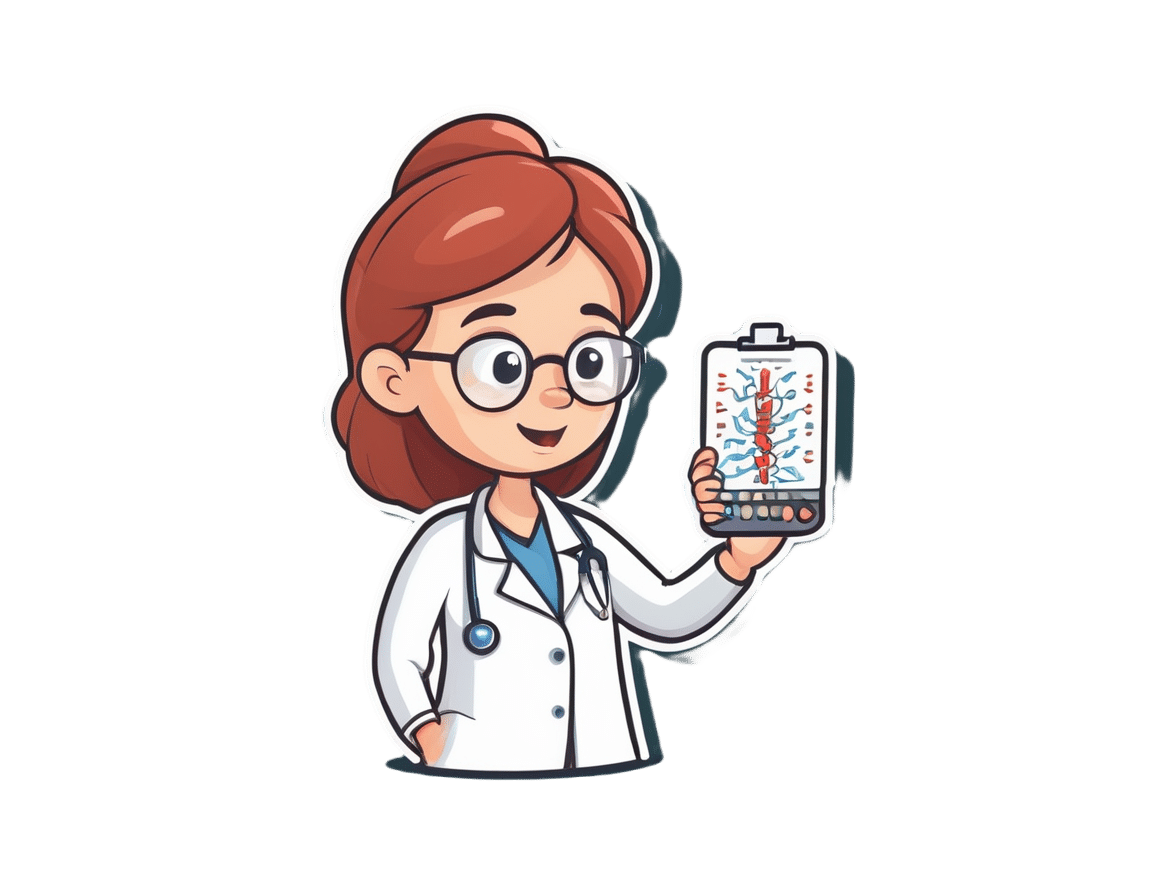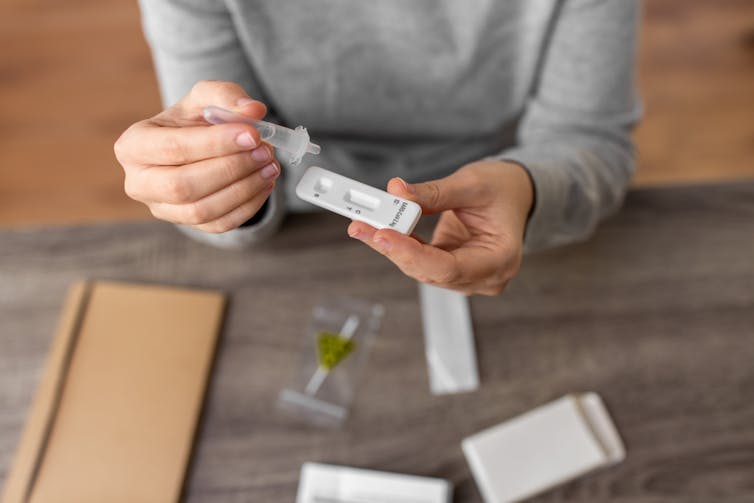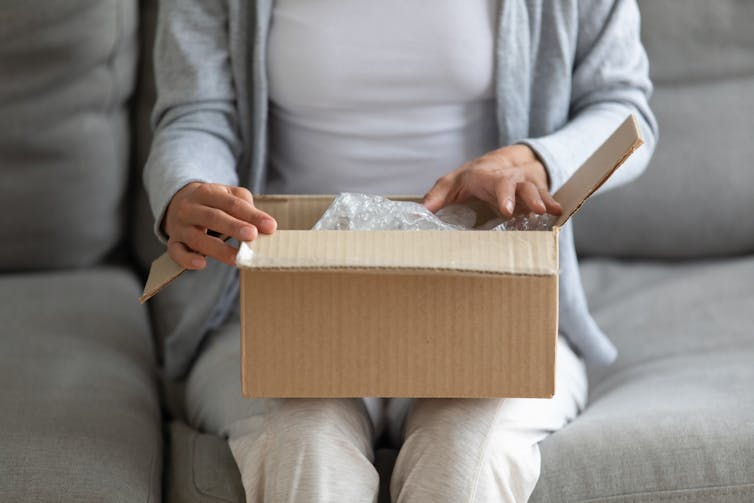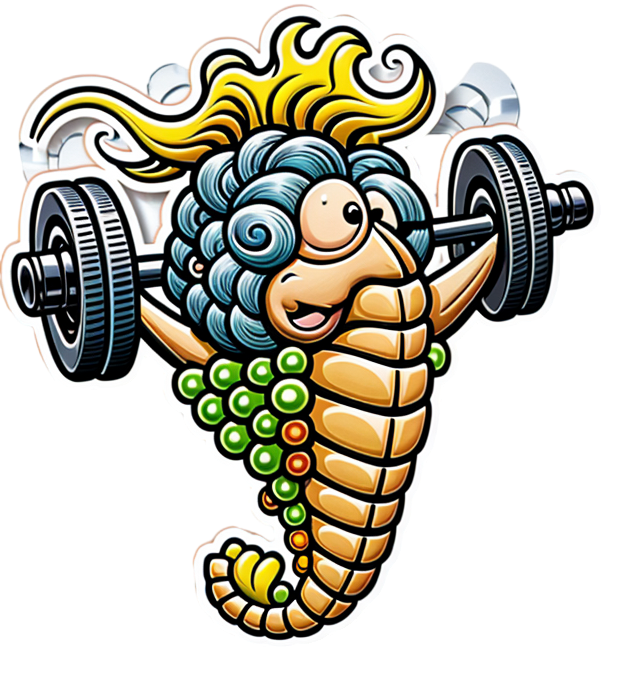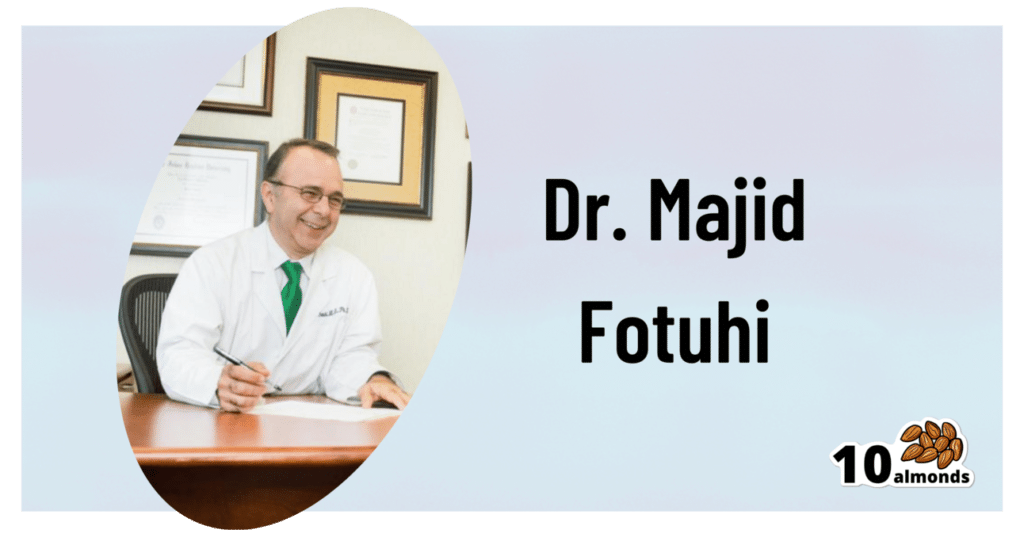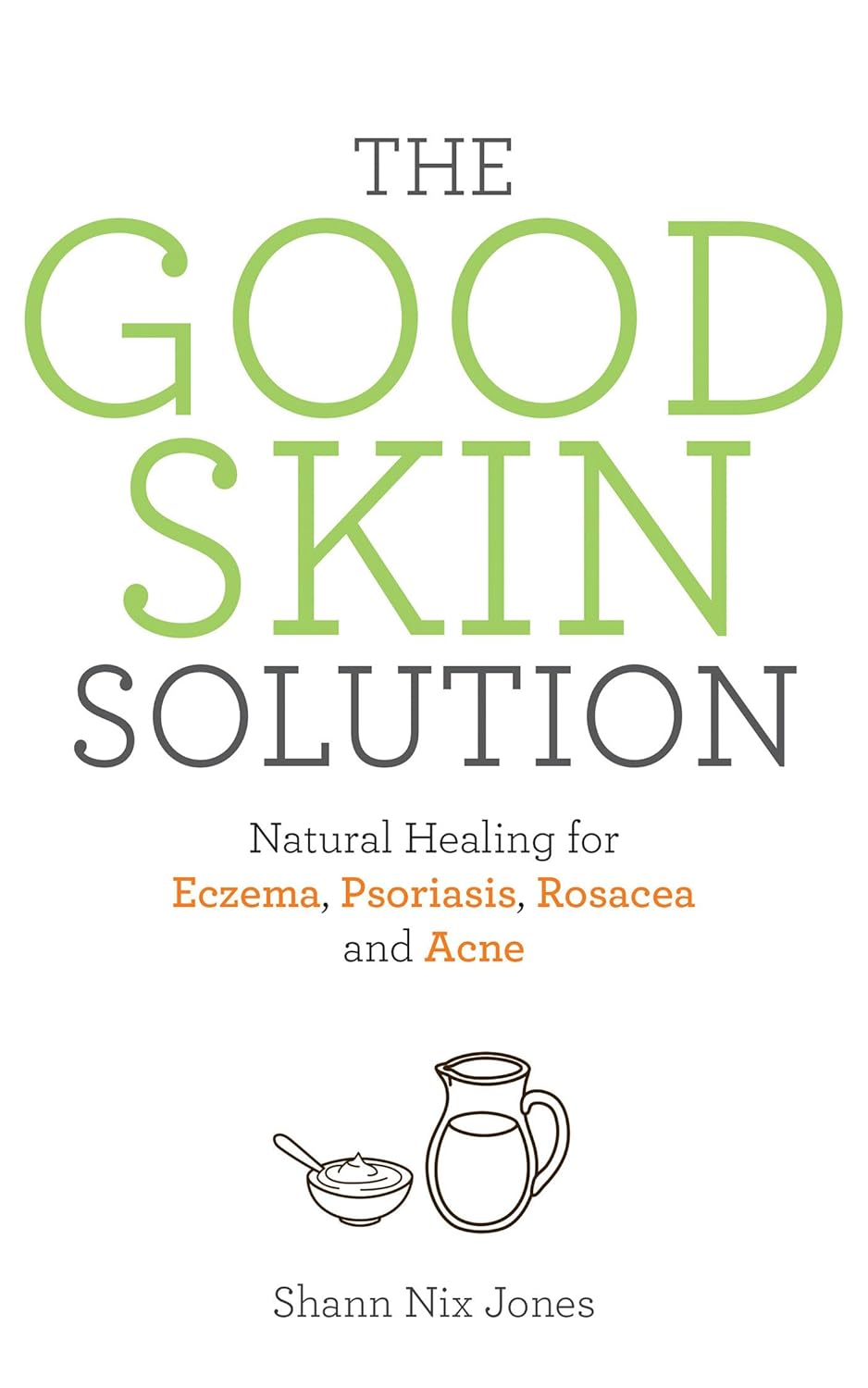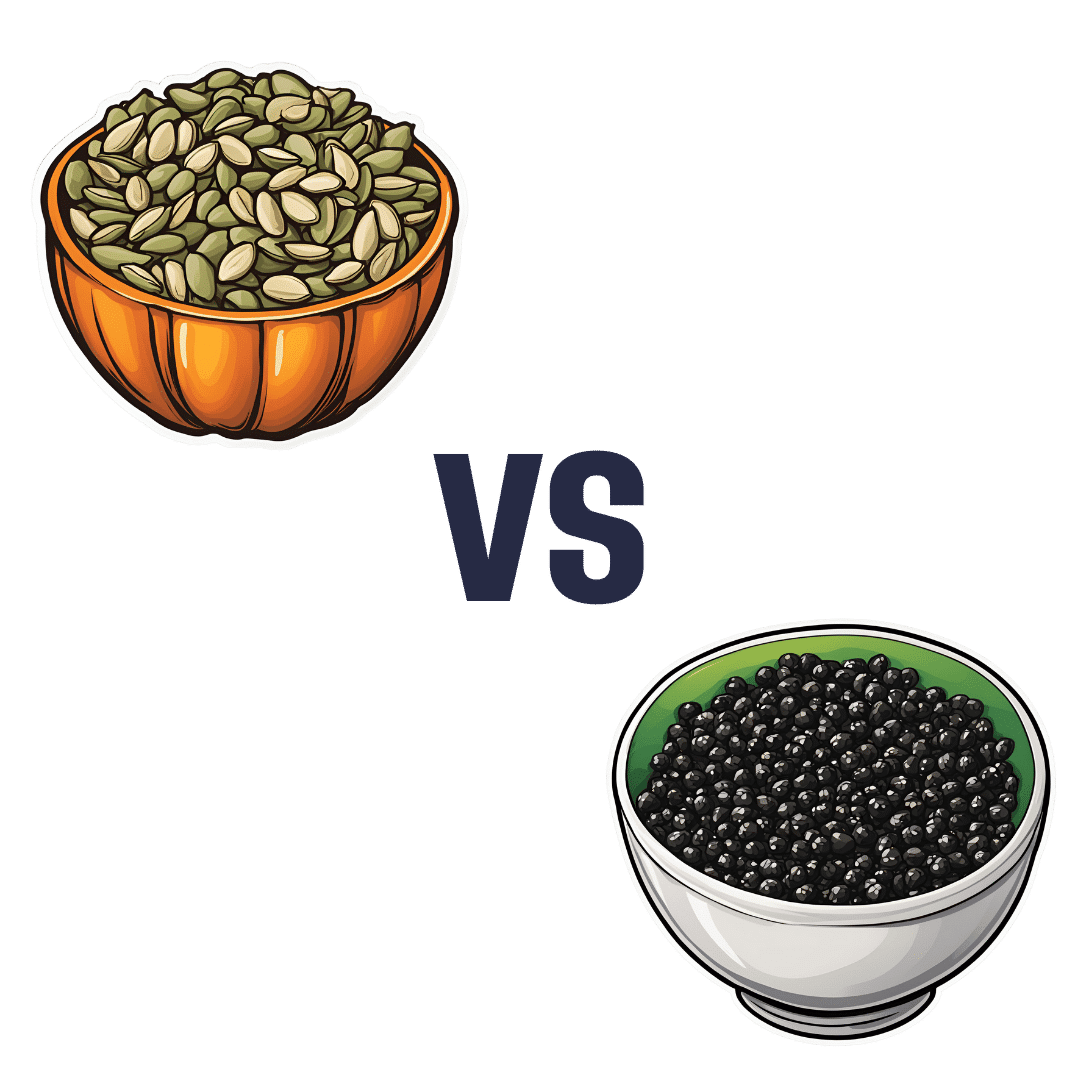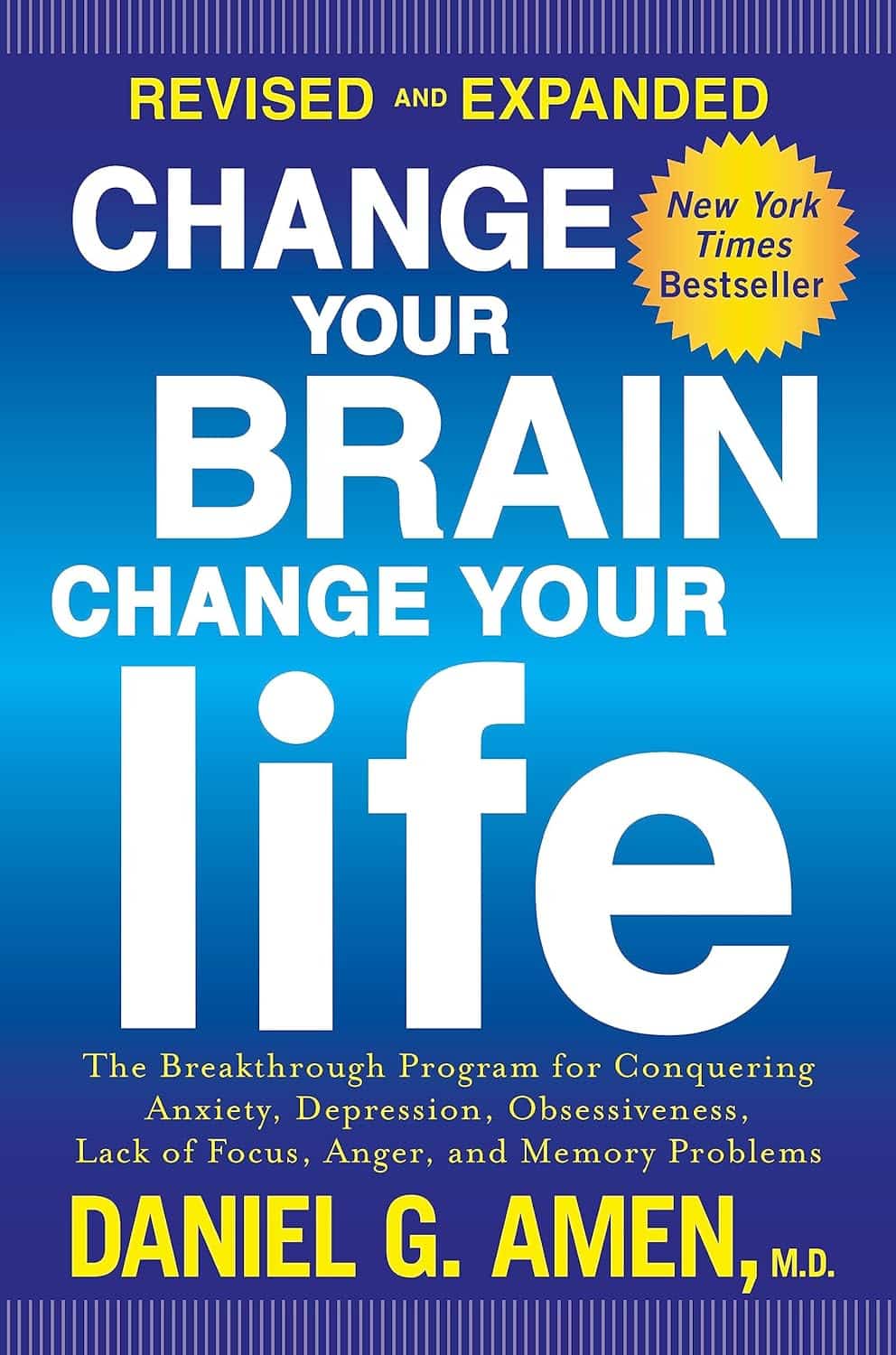
Change Your Brain, Change Your Life – by Dr. Daniel G. Amen
10almonds is reader-supported. We may, at no cost to you, receive a portion of sales if you purchase a product through a link in this article.
To what extent can we change our brains, and to what extent are we stuck with what we have?
Dr. Amen tells us that being mindful of both ends of this is critical:
- Neuroplasticity means we can, indeed, change our brains
- We do, however, have fundamental “brain types” based on our neurochemistry and physical brain structure
He argues for the use of brain imaging technology to learn more about the latter… In order to better go about doing what we can with the former.
The book looks at how these different brain types can lead to situations where what works as a treatment for one person can often not work for another. It’s also prescriptive, about what sorts of treatments (and lifestyle adjustments) are more likely to do better for each.
Where the book excels is in giving ideas and pointers for exploration… Things to take to one’s doctor, and—for example—request certain tests, and then what to do with those.
Where the book is a little light is on including hard science in the explanations. The hard science is referred to, but is considered beyond the scope of the book, or perhaps beyond the interest of the reader. That’s unfortunate, as we’d have liked to have seen more of it, rather than taking claims at face value without evidence.
Bottom line: this is distinctly “pop science” in presentation, but can give a lot of great ideas for learning more about our own brains and brain health… And then optimizing such.
Click here to check out “Change Your Brain; Change Your Life” on Amazon today!
Don’t Forget…
Did you arrive here from our newsletter? Don’t forget to return to the email to continue learning!
Recommended
Learn to Age Gracefully
Join the 98k+ American women taking control of their health & aging with our 100% free (and fun!) daily emails:
-
When Your Brain’s “Get-Up-And-Go” Has Got Up And Gone…
10almonds is reader-supported. We may, at no cost to you, receive a portion of sales if you purchase a product through a link in this article.
Sometimes, there are days when the body feels heavy, the brain feels sluggish, and even the smallest tasks feel Herculean.
When these days stack up, this is usually a sign of depression, and needs attention. Unfortunately, when one is in such a state, taking action about it is almost impossible.
Almost, but not quite, as we wrote about previously:
The Mental Health First-Aid You’ll Hopefully Never Need ← this is about as close to true mental health bootstrapping as actually works
Today though, we’re going to assume it’s just an off-day or such. So, what to do about it?
Try turning it off and on again
Sometimes, a reboot is all that’s needed, and if napping is an option, it’s worth considering. However, if you don’t do it right, you can end up groggy and worse off than before, so do check out:
How To Be An Expert Nap-Artist (No More “Sleep Hangovers”!)
If your exhaustion is nevertheless accompanied by stresses that are keeping you from resting, then there’s another “turn it off and on again” process for that:
Fuel in the tank
Our brain is an energy-intensive organ, and cannot run on empty for long. Thus, lacking energy can sometimes simply be a matter of needing to supply some energy. Simple, no? Except, a lot of energy-giving foods can cause a paradoxical slump in energy, so here’s how to avoid that:
Eating For Energy (In Ways That Actually Work)
There are occasions when exhausted, when preparing food seems like too much work. If you’re not in a position to have someone else do it for you, how can you get “most for least” in terms of nutrition for effort?
Many of the above-linked items can help (a bowl of nuts and/or dried fruit is probably not going to break the energy-bank, for instance), but beyond that, there are other considerations too:
How To Eat To Beat Chronic Fatigue (While Chronically Fatigued) ← as the title tells, this is about chronic fatigue, but the advice therein definitely goes for acute fatigue also.
The lights aren’t on
Sometimes it may be that your body is actually fine, but your brain is working in a clunky fashion at best. Assuming there is no more drastic underlying cause for this, a lack of motivation is often as simple as a lack of appropriate dopamine response. When that’s the case…
Lacking Motivation? Science Has The Answer
If, instead, the issue is more serotonin-based than dopamine based, then green places with blue skies are ideal. Depending on geography and season, those things may be in short supply, but the brain is easily tricked with artificial plants and artificial sunlight. Is it as good as a walk in the park on a pleasant summer morning? Probably not, but it’s many times better than nothing, so get those juices flowing:
Neurotransmitter Cheatsheet ← four for the price of one, here!
Schedule time for rest, or your body/brain will schedule it for you
There’s a saying in the field of engineering that “if you don’t schedule time for maintenance, your equipment will schedule it for you”, and the same is true of our body/brain. If you’re struggling to get good quantity, here’s how to at least get good quality:
How To Rest More Efficiently (Yes, Really)
And, importantly,
7 Kinds Of Rest When Sleep Is Not Enough
Take care!
Share This Post
-
You can now order all kinds of medical tests online. Our research shows this is (mostly) a bad idea
10almonds is reader-supported. We may, at no cost to you, receive a portion of sales if you purchase a product through a link in this article.
Elena.Katkova/Shutterstock Many of us have done countless rapid antigen tests (RATs) over the course of the pandemic. Testing ourselves at home has become second nature.
But there’s also a growing worldwide market in medical tests sold online directly to the public. These are “direct-to-consumer” tests, and you can access them without seeing a doctor.
While this might sound convenient, the benefits to most consumers are questionable, as we discovered in a recent study.
What are direct-to-consumer tests?
Let’s start with what they’re not. We’re not talking about patients who are diagnosed with a condition, and use tests to monitor themselves (for example, finger-prick testing to monitor blood sugar levels for people with diabetes).
We’re also not talking about home testing kits used for population screening, such as RATs for COVID, or the “poo tests” sent to people aged 50 and over for bowel cancer screening.
Direct-to-consumer tests are products marketed to anyone who is willing to pay, without going through their GP. They can include hormone profiling tests, tests for thyroid disease and food sensitivity tests, among many others.
Some direct-to-consumer tests allow you to complete the test at home, while self-collected lab tests give you the equipment to collect a sample, which you then send to a lab. You can now also buy pathology requests for a lab directly from a company without seeing a doctor.
We’ve all become accustomed to RATs during the pandemic.
Ground Picture/ShutterstockWhat we did in our study
We searched (via Google) for direct-to-consumer products advertised for sale online in Australia between June and December 2021. We then assessed whether each test was likely to provide benefits to those who use them based on scientific literature published about the tests, and any recommendations either for or against their use from professional medical organisations.
We identified 103 types of tests and 484 individual products ranging in price from A$12.99 to A$1,947.
We concluded only 11% of these tests were likely to benefit most consumers. These included tests for STIs, where social stigma can sometimes discourage people from testing at a clinic.
A further 31% could possibly benefit a person, if they were at higher risk. For example, if a person had symptoms of thyroid disease, a test may benefit them. But the Royal Australian College of General Practitioners does not recommend testing for thyroid disease in people without symptoms because evidence showing benefits of identifying and treating people with early thyroid disease is lacking.
Some 42% were commercial “health checks” such as hormone and nutritional status tests. Although these are legitimate tests – they may be ordered by a doctor in certain circumstances, or be used in research – they have limited usefulness for consumers.
A test of your hormone or vitamin levels at a particular time can’t do much to help you improve your health, especially because test results change depending on the time of day, month or season you test.
Most worryingly, 17% of the tests were outright “quackery” that wouldn’t be recommended by any mainstream health practitioner. For example, hair analysis for assessing food allergies is unproven and can lead to misdiagnosis and ineffective treatments.
More than half of the tests we looked at didn’t state they offered a pre- or post-test consultation.
Ordering medical tests online probably isn’t a good idea.
fizkes/ShutterstockProducts available may change outside the time frame of our study, and direct-to-consumer tests not promoted or directly purchasable online, such as those offered in pharmacies or by commercial health clinics, were not included.
But in Australia, ours is the first and only study we know of mapping the scale and variety of direct-to-consumer tests sold online.
Research from other countries has similarly found a lack of evidence to support the majority of direct-to-consumer tests.
4 questions to ask before you buy a test online
Many direct-to-consumer tests offer limited benefits, and could even lead to harms. Here are four questions you should ask yourself if you’re considering buying a medical test online.
1. If I do this test, could I end up with extra medical appointments or treatments I don’t need?
Doing a test yourself might seem harmless (it’s just information, after all), but unnecessary tests often find issues that would never have caused you problems.
For example, someone taking a diabetes test may find moderately high blood sugar levels see them labelled as “pre-diabetic”. However, this diagnosis has been controversial, regarded by many as making patients out of healthy people, a large number of whom won’t go on to develop diabetes.
2. Would my GP recommend this test?
If you have worrying symptoms or risk factors, your GP can recommend the best tests for you. Tests your GP orders are more likely to be covered by Medicare, so will cost you a lot less than a direct-to-consumer test.
3. Is this a good quality test?
A good quality home self-testing kit should indicate high sensitivity (the proportion of true cases that will be accurately detected) and high specificity (the proportion of people who don’t have the disease who will be accurately ruled out). These figures should ideally be in the high 90s, and clearly printed on the product packaging.
For tests analysed in a lab, check if the lab is accredited by the National Association of Testing Authorities. Avoid tests sent to overseas labs, where Australian regulators can’t control the quality, or the protection of your sample or personal health information.
4. Do I really need this test?
There are lots of reasons to want information from a test, like peace of mind, or just curiosity. But unless you have clear symptoms and risk factors, you’re probably testing yourself unnecessarily and wasting your money.
Direct-to-consumer tests might seem like a good idea, but in most cases, you’d be better off letting sleeping dogs lie if you feel well, or going to your GP if you have concerns.
Patti Shih, Senior Lecturer, Australian Centre for Health Engagement, Evidence and Values, University of Wollongong; Fiona Stanaway, Associate Professor in Clinical Epidemiology, University of Sydney; Katy Bell, Associate Professor in Clinical Epidemiology, Sydney School of Public Health, University of Sydney, and Stacy Carter, Professor and Director, Australian Centre for Health Engagement, Evidence and Values, University of Wollongong
This article is republished from The Conversation under a Creative Commons license. Read the original article.
Share This Post
-
Do Try This At Home: The 12-Week Brain Fitness Program
10almonds is reader-supported. We may, at no cost to you, receive a portion of sales if you purchase a product through a link in this article.
12 Weeks To Measurably Boost Your Brain
This is Dr. Majid Fotuhi. From humble beginnings (being smuggled out of Iran in 1980 to avoid death in the war), he went on (after teaching himself English, French, and German, hedging his bets as he didn’t know for sure where life would lead him) to get his MD from Harvard Medical School and his PhD in neuroscience from Johns Hopkins University. Since then, he’s had a decades-long illustrious career in neurology and neurophysiology.
What does he want us to know?
The Brain Fitness Program
This is not, by the way, something he’s selling. Rather, it was a landmark 12-week study in which 127 people aged 60–80, of which 63% female, all with a diagnosis of mild cognitive impairment, underwent an interventional trial—in other words, a 12-week brain fitness course.
After it, 84% of the participants showed statistically significant improvements in cognitive function.
Not only that, but of those who underwent MRI testing before and after (not possible for everyone due to practical limitations), 71% showed either no further deterioration of the hippocampus, or actual growth above the baseline volume of the hippocampus (that’s good, and it means functionally the memory center of the brain has been rejuvenated).
You can read a little more about the study here:
As for what the program consisted of, and what Dr. Fotuhi thus recommends for everyone…
Cognitive stimulation
This is critical, so we’re going to spend most time on this one—the others we can give just a quick note and a pointer.
In the study this came in several forms and had the benefit of neurofeedback technology, but he says we can replicate most of the effects by simply doing something cognitively stimulating. Whatever challenges your brain is good, but for maximum effect, it should involve the language faculties of the brain, since these are what tend to get hit most by age-related cognitive decline, and are also what tends to have the biggest impact on life when lost.
If you lose your keys, that’s an inconvenience, but if you can’t communicate what is distressing you, or understand what someone is explaining to you, that’s many times worse—and that kind of thing is a common reality for many people with dementia.
To keep the lights brightly lit in that part of the brain: language-learning is good, at whatever level suits you personally. In other words: there’s a difference between entry-level Duolingo Spanish, and critically analysing Rumi’s poetry in the original Persian, so go with whatever is challenging and/but accessible for you—just like you wouldn’t go to the gym for the first time and try to deadlift 500lbs, but you also probably wouldn’t do curls with the same 1lb weights every day for 10 years.
In other words: progressive overloading is key, for the brain as well as for muscles. Start easy, but if you’re breezing through everything, it’s time to step it up.
If for some reason you’re really set against the idea of learning another language, though, check out:
Reading As A Cognitive Exercise ← there are specific tips here for ensuring your reading is (and remains) cognitively beneficial
Mediterranean diet
Shocking nobody, this is once again recommended. You might like to check out the brain-healthy “MIND” tweak to it, here:
Four Ways To Upgrade The Mediterranean Diet ← it’s the fourth one
Omega-3 supplementation
Nothing complicated here. The brain needs a healthy balance of these fatty acids to function properly, and most people have an incorrect balance (too little omega-3 for the omega-6 present):
What Omega-3 Fatty Acids Really Do For Us ← scroll to “against cognitive decline”
Increasing fitness
There’s a good rule of thumb: what’s healthy for your heart, is healthy for your brain. This is because, like every other organ in your body, the brain does not function well without good circulation bringing plenty of oxygen and nutrients, which means good cardiovascular health is necessary. The brain is extra sensitive to this because it’s a demanding organ in terms of how much stuff it needs delivering via blood, and also because of the (necessary; we’d die quickly and horribly without it) impediment of the blood-brain barrier, and the possibility of beta-amyloid plaques and similar woes (they will build up if circulation isn’t good).
How To Reduce Your Alzheimer’s Risk ← number two on the list here
Practising mindfulness medication
This is also straightforward, but not to be underestimated or skipped over:
No-Frills, Evidence-Based Mindfulness
Want to step it up? Check out:
Meditation Games That You’ll Actually Enjoy
Lastly…
Dr. Fotuhi wants us to consider looking after our brain the same way we look after our teeth. No, he doesn’t want us to brush our brain, but he does want us to take small measurable actions multiple times per day, every day.
You can’t just spend the day doing nothing but brushing your teeth for the entirety of January the 1st and then expect them to be healthy for the rest of the year; it doesn’t work like that—and it doesn’t work like that for the brain, either.
So, make the habits, and keep them going
Take care!
Share This Post
Related Posts
-
The Good Skin Solution – by Shann Jones
10almonds is reader-supported. We may, at no cost to you, receive a portion of sales if you purchase a product through a link in this article.
Not everyone knows that eczema is not just a skin condition; it’s an autoimmune condition. And thus to heal one’s skin, the gut is a good place to start.
This is not your average gut health book though, because it is focused on optimizing things for one’s skin… Although the author herself learned about this while helping her husband to battle an MRSA infection. In other words, a multi-fronted battle for sure.
The advices in this book are good for, as the subtitle promises, an assortment of other skin conditions too, including psoriasis, rosacea, and acne. She covers the usual bases, and recommends probiotics, of which she’s particularly keen to praise kefir, while advising against the use of antibiotics unless absolutely necessary—something we’ve talked about from time to time at 10almonds, too.
Not content to merely cover those things, she also talks allergies, and walking the fine line between avoiding triggers and developing hypersensitivity by treating to live in a perfectly clean bubble.
Ultimately, she offers “7 daily habits”, 3 of which involve goat’s milk kefir, that’s how keen on it she is. So if you’re vegan, probably this book isn’t as good value, however much it discusses the health woes that can be caused and/or exacerbated by drinking cow’s milk.
The style is very light and personable, which makes for easy reading, more like one friend talking to another, than a scientific textbook.
Bottom line: if you’d like healthier skin, are interested in dietary tweaks and homemade soaps, and have no aversion to goat’s milk and/or kefir, then this book is full of fascinating pointers.
Click here to check out The Good Skin Solution, and who knows, maybe you’ll find it’s the G.O.A.T!
Don’t Forget…
Did you arrive here from our newsletter? Don’t forget to return to the email to continue learning!
Learn to Age Gracefully
Join the 98k+ American women taking control of their health & aging with our 100% free (and fun!) daily emails:
-
Who Initiates Sex & Why It Matters
10almonds is reader-supported. We may, at no cost to you, receive a portion of sales if you purchase a product through a link in this article.
In an ideal world, it wouldn’t matter any more than who first says “let’s get something to eat” when hungry. But in reality, it can cause serious problems on both sides:
Fear and loathing?
The person who initiates gets the special prize of an n% chance of experiencing rejection, and then what? Try again, and again, and risk seeming pushy? Or leave the ball in the other person’s court, where it may then go untouched for the next few months, because (in the most positive scenario) they were waiting for you to initiate at a better time for them?
The person who does not initiate, and/but does not want sex at that time, gets the special prize of either making their partner feel unwanted, insecure, and perhaps unloved, or else grudgingly consenting to sex that’s going to be no fun while your heart’s not in it, and thus create the same end result plus you had an extra bad experience?
So, that sucks all around:
- Initiating touch (sex or cuddling) can feel like a test of being wanted, whereupon a lack of initiation or response may be misinterpreted as a lack of love or appreciation.
- Meanwhile, non-reciprocation might stem from exhaustion or unrelated issues. For many, it’s a physiological lottery.
10almonds note: not discussed in this video, but for many couples, problems can also arise because one partner or another just isn’t showing up with the expected physical signs of physiological arousal, so even if they say (and mean!) an enthusiastic “yes”, their body’s signs get misread as a “not really, though”, resulting in one partner feeling rejected, and both feeling inadequate—on account of something that was completely unrelated to how the person actually felt about the prospect of sex*.
*Sometimes, physiological arousal will simply not accompany psychological arousal, no matter how sincere the latter. And on the flipside, sometimes the signs of physiological arousal will just show up without psychological arousal. The human body is just like that sometimes. We all must listen to our partners’ words, not their genitals!
The solution to this problem is thus the same as the solution to the rest of the problem that is discussed in the video, and it’s: good communication.
That can be easier said than done, of course—not everyone is at their most eloquent in such situations! Which is why it can be important to have those conversations first outside of the bedroom when the stakes are low/non-existent.
Even with the best communication, a more general, overarching non-reciprocity (real or perceived) of sexual desire can cause bitterness, resentment, and can ultimately be relationship-ending if a resolution that’s acceptable to everyone involved is not found.
Ultimately, the work as a couple must begin from within as individuals—addressing self-worth issues to better navigate love and intimacy.
For more on all of this, enjoy:
Click Here If The Embedded Video Doesn’t Load Automatically!
Want to learn more?
You might also like to read:
Relationships: When To Stick It Out & When To Call It Quits
Take care!
Don’t Forget…
Did you arrive here from our newsletter? Don’t forget to return to the email to continue learning!
Learn to Age Gracefully
Join the 98k+ American women taking control of their health & aging with our 100% free (and fun!) daily emails:
-
Pumpkin Seeds vs Watermelon Seeds – Which is Healthier?
10almonds is reader-supported. We may, at no cost to you, receive a portion of sales if you purchase a product through a link in this article.
Our Verdict
When comparing pumpkin seeds to watermelon seeds, we picked the watermelon.
Why?
Starting with the macros: pumpkin seeds have a lot more carbs, while watermelon seeds have a lot more protein, despite pumpkin seeds being famous for such. They’re about equal on fiber. In terms of fats, watermelon seeds are higher in fats, and yes, these are healthy fats, mostly polyunsaturated.
When it comes to vitamins, pumpkin seeds are marginally higher in vitamins A and C, while watermelon seeds are a lot higher in vitamins B1, B2, B3, B5, B6, and B9. An easy win for watermelon seeds here.
In the category of minerals, despite being famous for zinc, pumpkin seeds are higher only in potassium, while watermelon seeds are higher in iron, magnesium, manganese, and phosphorus; the two seeds are equal on calcium, copper, and zinc. Another win for watermelon seeds.
In short, enjoy both, but watermelon has more to offer. Of course, if buying just the seeds and not the whole fruit, it’s generally easier to find pumpkin seeds than watermelon seeds, so do bear in mind that pumpkin seeds’ second place isn’t that bad here—it’s just a case of a very nutritious food looking bad by standing next to an even better one.
Want to learn more?
You might like to read:
Seed Saving Secrets – by Alice Mirren
Take care!
Don’t Forget…
Did you arrive here from our newsletter? Don’t forget to return to the email to continue learning!
Learn to Age Gracefully
Join the 98k+ American women taking control of their health & aging with our 100% free (and fun!) daily emails:

